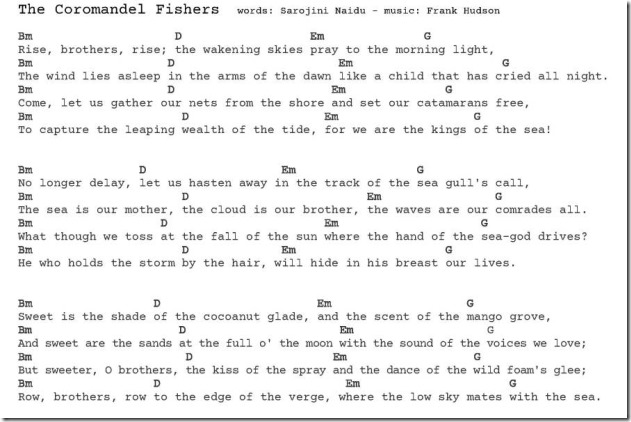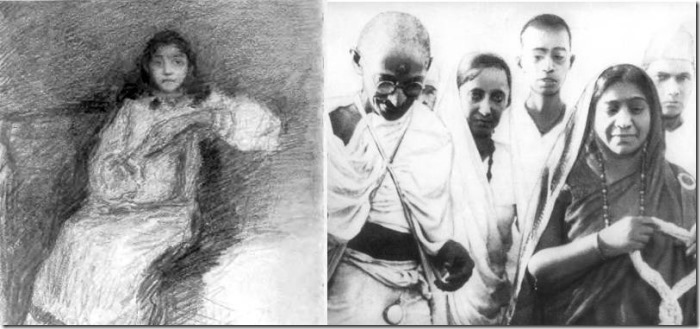It’s Poem in Your Pocket Day in the midst of U. S. National Poetry Month. This lily gilding observance aims to integrate poetry more completely with ordinary life. A great way to do that would be to bring poetry and our workdays together, something we rarely do.
For National Poetry Month I have been selecting and performing poems from a pair of poetry anthologies published in the 1920s for children: The Boys and The Girls Book of Verse. There’s little in the two books about ordinary work life. You might explain that as “Well, those books were for kids after all” — but the same could be said about many a poetry collection or anthology, then or now.
Our last piece, a famous poem by Wordsworth, touches on the weariness of work, speaking of the getting and spending part of life. Other than military service, there is little else in these children’s books about working for a living, so today’s piece stands out. “The Coromandel Fishers” sounds, even on the page, like a folk song, a work song, something that might be sung in the tedium and effort of daily labor. It’s author, Sarojini Naidu, published it in a section of her poetry that she called “Folk Songs,” so it really does ask to be sung, which you’ll see below I’ve done.
A reminder of the casual game I’m playing here with this pair of gendered anthologies: was this in the girls or boys book of verse? Answer below.
.
Naidu is little known in America but led a fascinating and significant life. She was born in an India ruled by Great Britain as a colonial possession, was educated in England, and during that education touched bases with literary figures there. William Butler Yeats’ father, an artist, sketched her as a young student, and while a young poet she was called “The Yeats of India.” Despite that start, she more-or-less left poetry for a life of political activism. Upon her return to India she became a key lieutenant of Gandhi, marched and strategized with him, was imprisoned twice by the British for her activism, and after Indian independence served in the new Indian government.
The young Naidu while studying in England as sketched by W. B. Yeats’ father, and during the famous Salt March with Gandhi. Gandhi thought the Salt March would be to arduous for women, Naidu thought otherwise.
.
I happen to have had a few more hours to work on music this past week as my teenager has started their first job. I, an old man, think often about my decades of paid labor. I recall the dailiness — yes, sometimes the weariness — of that. But here’s what I think of more often: the coworkers — A fair feld, ful of folk, fond I there bytwene, of alle manere of men, the mene and the pore, worchyng and wandryng as this world asketh.* I recall the thereness of these, my colleagues for the majority of my life’s waking hours, working in common cause. I’d often have a poem in my pocket in those years, a draft of my own, or a song of another on those days after days. Another thought: not often enough was the poem in my pocket about them, about the world of work we shared. Wordsworth said in his poem I sang last time that “The world is too much with us” — and we poets too often, too completely, stop at that phrase. I tried to outline in response: Wordsworth’s poem is more complex than we think it is, that his poem says everything is out of tune. Naidu’s fishermen, like the political activism she joined after writing this poem, says that we may sing to align us with the world.
Here’s an anecdote I read about Naidu. At the end of her life, she was weary from the wear-and-tear of political administration. Doctors said she must stop at whatever place she found herself, but she was restless, she could not rest. Finally, she asked a nurse to sing to her, and she fell asleep. In that night she died.
A couple unrelated last notes, and then you’ll have the opportunity to hear my performance of the song I made from Sarojini Naidu’s poem. She seems to have been the only person of color to have a poem in the two 1920s children’s anthologies,** and just as Wordsworth’s from last time, her poem of a world that’s with us, late and soon, ends up invoking the god of the sea. The audio player to hear me sing Naidu is below. No player? It’s not washed overboard, some ways of reading this blog hide it, so you can use this link as an alternative.
.
*Autocorrect didn’t have a stroke — can’t you read English? It’s a passage from the medieval poem Piers Plowman:
A fair field full of folk · found I in between,
Of all manner of men · the rich and the poor,
Working and wandering · as the world asketh.
**A fault I wouldn’t expect in any modern anthology for children, there are just too many good choices that are well-known and published now. It wouldn’t have hurt them to include a poem by American Paul Laurence Dunbar, or one of the translations from Chinese or Japanese by Arthur Walley — though the latter were new on the bookshelves at the time. I’ll allow them an excuse on a case near enough to the one for these 1922-1923 anthologies’ almost complete exclusion of Modernist poetry.
Are you taking part in this month’s quiz on which gendered book of verse Naidu’s poem appeared in. It was in The Boys Book of Verse.

